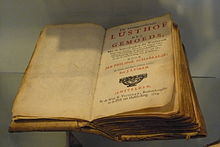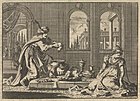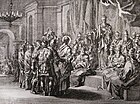Jan Luyken

Johannes or Jan Luyken (April 16, 1649 – April 5, 1712) was a Dutch poet, illustrator, and engraver.[1]
Biography[]


He was born and died in Amsterdam, where he learned engraving from his father Kaspar Luyken.[1] He married at 19 and had several children, of who Kasparus Luiken also became a renowned engraver.[1] He had a religious experience at age 26 that inspired him to write moralistic poetry.[1]
Works[]
He illustrated the 1685 edition of the Martyrs Mirror with 104 copper etchings. Thirty of these plates survive and are part of The Mirror of the Martyrs exhibit.[2]
He also published Het Menselyk Bedryf ("The Book of Trades") in 1694, which contains numerous engravings, by Luiken and his son Caspar (Caspaares), of 17th-century trades.
Cultural references[]
Joris-Karl Huysmans' anti-hero Des Esseintes in À rebours was an admirer of Luyken's engravings and had prints from his Religious Persecutions hung in his drawing room. He described them as "appalling engravings containing all the tortures that the madness of religion could devise." Des Esseintes was enthralled not just by Luyken's graphic depictions but his ability to reconstruct times and places in his works.
Gallery[]

Jesus the Teacher

Serious mistreatment of Christian slaves by the Turks

Turk and clergyman with Christian slaves (1684)

The Cruelty of Shah Safi (1697)

Anne Boleyn's Execution

Alexander Farnese marries Maria Princess of Portugal (1720)
Notes[]
- ^ Jump up to: a b c d Kort verhaal Van het godvruchtig leven En zalig afsterven Van Joannes Luiken (Short story of the religious life and peaceful death of Joannes Luiken) in the DBNL
- ^ "The Mirror of the Martyrs". Bethel College. Archived from the original on December 28, 2007. Retrieved December 24, 2007.
External links[]
![]() Media related to Jan Luyken at Wikimedia Commons
Media related to Jan Luyken at Wikimedia Commons
- Works by or about Jan Luyken at Internet Archive
- Works by Jan Luyken at LibriVox (public domain audiobooks)

- 1649 births
- 1712 deaths
- 17th-century Dutch poets
- Dutch male poets
- Dutch illustrators
- Engravers from Amsterdam
- Writers from Amsterdam
- Dutch Golden Age printmakers
- Catholic engravers







